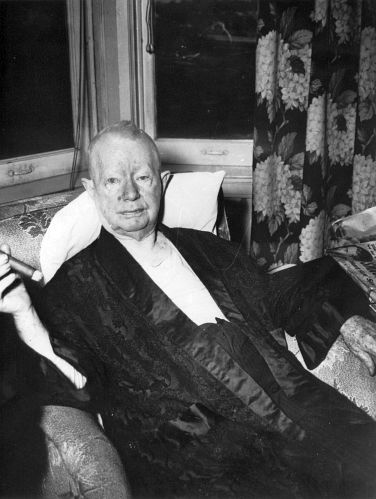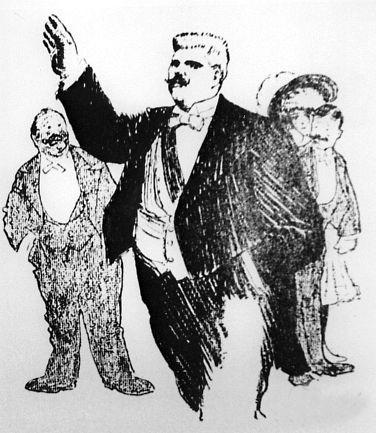|
The administration of Rahm Emanuel as the newly-elected mayor of Chicago should certainly be ethically superior to those of a century earlier. [Author's note: Rahm's wonderful father, Ben Emanuel, was pediatrician to my three children andonce saved the life of my eldest son.] Many of Emanuel's early-day predecessor's looked upon the job as mayor as a path to great riches, particularly Carter Harrison Sr. (1825-1893), and his son, Carter Harrison, Jr. (1860-1953). Each held five terms in the office and, during those long reigns, all manner of crime and corruption flourished in Chicago. The real bosses of the city through those Red Light decades were two utterly venal Irish aldermen, Michael "Hinky-Dink" Kenna and "Bathhouse John" Coughlin.
Kenna opened a saloon in 1882 in Chicago's First Ward, which became the center of political activity and the hub of vice in Chicago for decades to come. Many a political election was settled over its bar or in its back room, where Kenna and his friend, John "Bathhouse John" Coughlin, arbitrated Chicago's political future.
Kenna befriended the big, outgoing Coughlin in the mid-1880s and the two formed a political partnership which controlled all the rackets and vice in the city for a half century. Coughlin, who got his nickname by starting as a rubber in a bathhouse, was a tremendous vote getter and worked the wards of the city, thumping for the candidates picked by Kenna and the machine. Kenna, a quiet, taciturn type with a dour nature, quietly controlled city hall and the police department by arranging for bribes, payoffs, and protection for the various crime czars from one era to the next.
 |
 |
| Chicago alderman Michael "Hinky Dink" Kenna, shown in old age, who protected the city rackets for decades and died a millionaire. |
It was Kenna who aided Michael Cassius "Big Mike" McDonald in his takeover of all criminal operations in Chicago during the 1880s. In return for allowing McDonald's gambling dens and brothels to operate without any problems from the city, Kenna and, subsequently, city officials, received enormous payoffs. The Levee, or "Red Light", District, which was located in the First Ward, was utterly controlled by Kenna, who served as alderman from 1897 until 1923. When Big Mike McDonald passed from the scene, Kenna hand-picked the next crime boss of the city, James "Big Jim" Colosimo, a one-time street sweeper, who had formerly worked as Kenna's bagman, collecting the tribute each week from bordellos and gambling spas.
Kenna spent most of his time arranging for police and political protection for Colosimo's rackets and the thriving vice in his first ward. Sometimes he would actually be present to vote in the city council. The mayor had no choice but to tolerate his high-handed ways, since Hinky Dink could politically make or break any man in Chicago.
At one point, Kenna was called to the office of Mayor Carter Harrison Jr. He was asked why a certain precinct captain in the first ward refused to take orders from City Hall. Said Kenna to Harrison: "If you give him another chance you'll never need to complain. He's a good, conscientious s.o.b., even if he does run a whorehouse."
|
 |
It was well known at City Hall that Kenna received enormous payoffs for the gambling halls and bordellos operating around the clock in his ward, not the least of which was the lavish Everleigh Club run by Ada and Minna Everleigh, the most celebrated brothel in America. When, on another occasion, Mayor Harrison obliquely mentioned the payoffs to Kenna, the little alderman exploded, shouting: "I never took a dollar from a woman! No house ever paid me for protection!"
 |
 |
| Chicago alderman "Bathhouse John" Coughlin in formal attire while delivering one of his poems at the notorious First War Ball, which was always crowded by hundreds of criminals. |
Harrison calmed him down and then Kenna remarked: "Of course, I'd just as soon run a poker game or a faro bank of a big kind, you know, Mr. Mayor, in a nice hotel room for high-fliers to play, no suckers. You know, men that love to play and can afford to pay. I'm strong for that."
Mayors were bullied and pacified by Kenna (and grew rich through payoffs) while he and Coughlin flexed their political muscles each year as sponsors of the notorious First Ward Ball. At these annual balls every thug, prostitute, racketeer and corrupt politician, usually no fewer than 15,000 of the most unsavory people in the city, gathered together to pay homage to Kenna and Coughlin. At such times, Coughlin, who thought of himself as a great poet, would recite some of his mawkish verse. One such inspired ditty:
"On with the dance.
Let the orgy be perfectly proper.
Don't drink, smoke, or spit on the floor.
And, say, keep your eye on the copper."
In 1911, religious leaders and civic reformers would no longer tolerate the wide-open operations of the Levee. Reformers led marches through the district by torchlight, demanding the closing of brothels and gambling halls. City Hall finally capitulated and the Red Light District was shut down. Kenna and Coughlin moaned in despair and their power waned even further when Colosimo was murdered in 1920 by Al Capone, top enforcer for the new crime boss, Johnny Torrio.
By 1923, Kenna was finished as a political power in Chicago. He stepped down from his post and let Coughlin take his place, but he continued operating his saloon throughout Prohibition. When Coughlin died in 1938, Kenna took his post the following year. He continued to attend all city council meetings, despite his advanced age. Kenna maintained a suite of rooms at the Blackstone Hotel and died there, alone, on October 9, 1946.
In contrast to Coughlin, who died broke, the frugal Kenna left an estate of well over $2 million. Hinky Dink's funeral was one of the largest ever seen in Chicago, rivaling any gangster funeral of the 1920s. Thousands of mourners attended and even some of Coughlin's ancient poetry and songs were read and sung. This would have irked Kenna no end for he hated the doggerel his friend had written over the years and could only stand to listen to such "crazy nonsense" when drunk.
View as a single-column galley proof
View as a feature
|